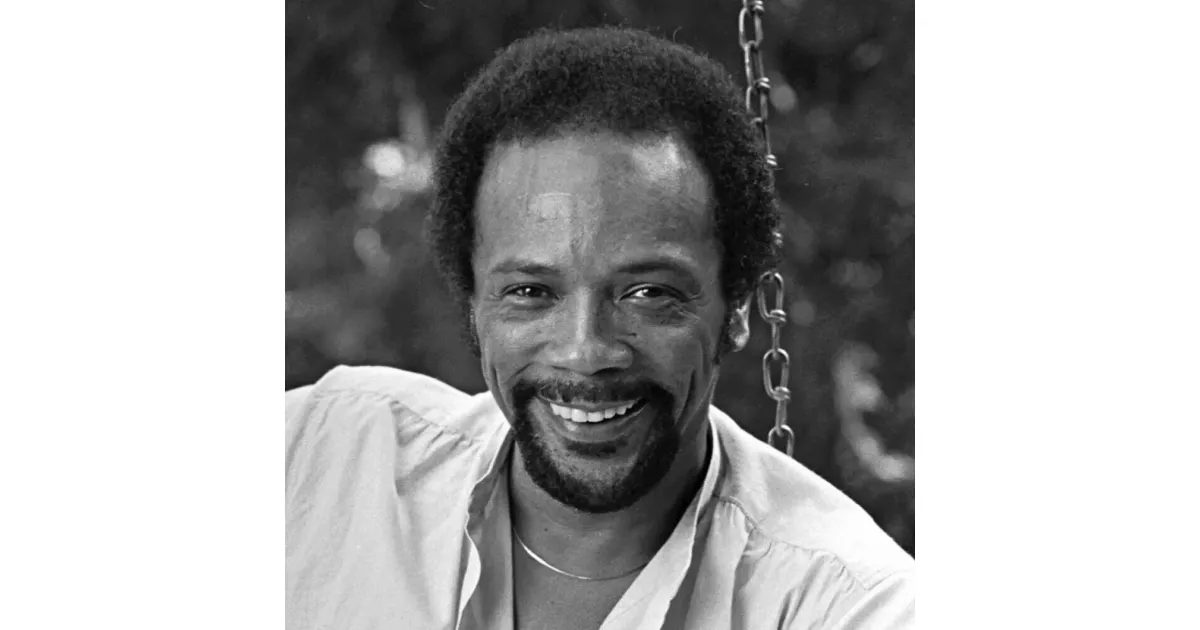From career breakthroughs to professional milestones, explore how Quincy Jones made an impact.
Quincy Jones is a highly acclaimed American record producer, composer, arranger, conductor, trumpeter, and bandleader with a career spanning seven decades. He's garnered significant recognition, including 28 Grammy Awards, a Primetime Emmy Award, and a Tony Award. Furthermore, he has been nominated for seven Academy Awards and four Golden Globe Awards, solidifying his impact and contribution to the music and entertainment industry.
1953: European Tour with Lionel Hampton
In 1953, at the age of 20, Quincy Jones toured Europe with jazz bandleader Lionel Hampton, an experience that broadened his perspective on racism and global conflicts.
1954: Settled in New York
After leaving the Hampton band in 1954, Quincy Jones settled in New York and began writing music professionally.
1956: CBS' Stage Show with Elvis Presley
In early 1956, Quincy Jones played second trumpet in the studio band that supported Elvis Presley in his first six television appearances on CBS' Stage Show.
1957: Moved to Paris
In 1957, Quincy Jones moved to Paris to study composition and theory and became music director at Barclay, a French record company.
1958: First collaboration with Frank Sinatra
In 1958, Quincy Jones first worked with Frank Sinatra when invited by Princess Grace to arrange a benefit concert at the Monaco Sporting Club.
1961: Vice-President of Mercury Records
In 1961, Quincy Jones was promoted to Vice-President of Mercury Records, becoming the first African American to hold that position.
1962: "Soul Bossa Nova" tune originated
In 1962, Quincy Jones's tune "Soul Bossa Nova" originated on the Big Band Bossa Nova album.
1963: Produced "It's My Party" and "She's a Fool"
In 1963, Quincy Jones produced Lesley Gore's hit singles "It's My Party" and "She's a Fool", contributing to her early success.
1964: Arranged and conducted 'It Might as Well Be Swing'
In 1964, Quincy Jones arranged and conducted Frank Sinatra's second album with Count Basie, 'It Might as Well Be Swing'.
1964: Composed music for 'The Pawnbroker'
In 1964, Quincy Jones composed music for 'The Pawnbroker' at the invitation of director Sidney Lumet, marking his entry into major motion picture scores.
1964: Produced "Judy's Turn to Cry" and "You Don't Own Me"
In 1964, Quincy Jones produced Lesley Gore's "Judy's Turn to Cry" and "You Don't Own Me", which became notable hits.
June 1965: Sinatra, Sammy Davis Jr., Dean Martin, and Johnny Carson performed with Basie orchestra in St. Louis
In June 1965, Jones was the arranger/conductor when Sinatra, Sammy Davis Jr., Dean Martin, and Johnny Carson performed with the Basie orchestra in St. Louis.
October 16, 1965: Sinatra and Basie on 'The Hollywood Palace'
On October 16, 1965, Quincy Jones was the arranger/conductor when Frank Sinatra and Count Basie appeared on 'The Hollywood Palace' TV show.
1965: Composed film score for 'The Pawnbroker'
In 1965, Quincy Jones composed the film score for 'The Pawnbroker', marking the first of nearly 40 major motion picture scores.
1965: Produced "Look of Love", "Maybe I Know", "Sunshine, Lollipops And Rainbows", and "My Town, My Guy And Me"
In 1965, Quincy Jones produced several more notable hits for Lesley Gore, including "Look of Love", "Maybe I Know", "Sunshine, Lollipops And Rainbows", and "My Town, My Guy And Me".
1965: Composing film scores for Mirage and The Slender Thread
In 1965, following the success of 'The Pawnbroker', Quincy Jones composed film scores for 'Mirage' and 'The Slender Thread', leading to high demand as a composer.
1966: Conducted and arranged 'Sinatra at the Sands'
In 1966, Quincy Jones conducted and arranged Frank Sinatra's live album with the Basie Band, 'Sinatra at the Sands'.
1966: Continued to produce for Lesley Gore
Quincy Jones continued to produce for Lesley Gore until 1966, marking the end of a successful collaboration.
1967: Composed film scores for 'In the Heat of the Night' and 'In Cold Blood'
In 1967, Quincy Jones composed the film scores for both 'In the Heat of the Night' and 'In Cold Blood', further establishing his career as a composer.
1967: Nominated for Academy Award for Best Original Score
In 1967, Quincy Jones was nominated for an Academy Award for Best Original Score for In Cold Blood, making him the first African American to be nominated twice in the same year.
1968: First Academy Award Nomination for Best Original Song
In 1968, Quincy Jones became the first African American to be nominated for an Academy Award for Best Original Song for "The Eyes of Love".
1969: Composed film score for 'The Italian Job'
In 1969, Quincy Jones composed the film score for 'The Italian Job', contributing to another notable film.
1971: First African American musical director and conductor of the Academy Awards
In 1971, Quincy Jones became the first African American to be the musical director and conductor of the Academy Awards.
1975: Founded Qwest Productions and Reunited with Lesley Gore
In 1975, Quincy Jones founded Qwest Productions and reunited with Lesley Gore, producing her critically acclaimed album Love Me By Name.
1977: Primetime Emmy Award for 'Roots'
In 1977, Quincy Jones won the Primetime Emmy Award for Outstanding Music Composition for a Series for the miniseries 'Roots'.
1978: Composed film score for 'The Wiz'
In 1978, Quincy Jones composed the film score for 'The Wiz', a musical adaptation of The Wizard of Oz.
1978: Produced 'The Wiz' Soundtrack
In 1978, Quincy Jones produced the soundtrack for 'The Wiz', starring Michael Jackson and Diana Ross, leading to his collaboration with Michael Jackson on his solo album.
1979: Production of "Off the Wall"
In 1979, Quincy Jones produced Michael Jackson's album "Off the Wall", marking a significant milestone in both of their careers.
1981: Release of album 'The Dude'
In 1981, Quincy Jones released his album 'The Dude', which featured hits such as 'Ai No Corrida', 'Just Once', and 'One Hundred Ways'.
1982: Production of "Thriller"
In 1982, Quincy Jones produced Michael Jackson's album "Thriller", which became the highest-selling album of all time.
1984: Teamed up for 'L.A. Is My Lady'
In 1984, Frank Sinatra and Quincy Jones teamed up for the album 'L.A. Is My Lady'.
1985: Recorded 'We Are the World'
After the 1985 American Music Awards, Quincy Jones gathered major recording artists to record 'We Are the World' for famine relief in Ethiopia.
1985: Composed film score for 'The Color Purple'
In 1985, Quincy Jones composed the film score for 'The Color Purple', adding to his repertoire of film scores.
1985: Film producer for 'The Color Purple'
In 1985, Quincy Jones debuted as a film producer with 'The Color Purple', which received 11 Oscar nominations.
1986: Started Qwest Entertainment
In 1986, Quincy Jones started Qwest Entertainment to produce films and manage his media ventures, including Qwest Records and Qwest Music Publishing.
1987: Production of "Bad"
In 1987, Quincy Jones produced Michael Jackson's album "Bad", which sold 45 million copies, concluding their collaborations.
1990: Created Quincy Jones Entertainment (QJE)
In 1990, Quincy Jones Productions joined with Time Warner to create Quincy Jones Entertainment (QJE), signing deals with Warner Bros. and NBC Productions.
1991: Miles Davis agrees to perform at Montreux Jazz Festival
In 1991, despite suffering from pneumonia, Miles Davis relented to Quincy Jones' long-term persuasion and agreed to perform Gil Evans' arrangements at the Montreux Jazz Festival, resulting in his last album, Miles & Quincy Live at Montreux.
1993: Produces An American Reunion
In 1993, Quincy Jones collaborated with David Salzman to produce the concert An American Reunion, celebrating Bill Clinton's inauguration, and renamed his company to Quincy Jones/David Salzman Entertainment.
1994: Produced 'The Jenny Jones Show'
In 1994, Quincy Jones Entertainment began producing the first-run syndication of 'The Jenny Jones Show'.
1995: Produces Mad TV
In 1995, Jones began producing his own sketch comedy show, FOX's Mad TV, which ran for many years.
1995: Receives Jean Hersholt Humanitarian Award
In 1995, Quincy Jones became the first African American to receive the academy's Jean Hersholt Humanitarian Award.
1995: 'In the House' aired on NBC and UPN
In 1995, the television show 'In the House', produced by Quincy Jones Entertainment, began airing on NBC and UPN, continuing until 1999.
1997: Produced 'The Jenny Jones Show' until 1997
In 1997, Quincy Jones Entertainment ended its production of the first-run syndication of 'The Jenny Jones Show'.
1997: "Soul Bossa Nova" used in Austin Powers
In 1997, Quincy Jones's 1962 tune "Soul Bossa Nova" was used as the theme for the spy comedy Austin Powers: International Man of Mystery.
2001: Becomes honorary member of the board of directors of the Jazz Foundation of America
In 2001, Quincy Jones became an honorary member of the board of directors of the Jazz Foundation of America and worked to support elderly jazz and blues musicians.
2001: Publishes Autobiography
In 2001, Quincy Jones published his autobiography Q: The Autobiography of Quincy Jones.
2001: Audio interviews included in special editions
In 2001, audio interviews with Quincy Jones were included in the special editions of Michael Jackson's 'Off the Wall', 'Thriller', and 'Bad' albums.
2004: Helps launch We Are the Future project
In 2004, Quincy Jones helped launch the We Are the Future (WAF) project, providing opportunities for children in impoverished and conflict-ridden areas.
July 2007: Starts Quincy Jones Video Podcast
In July 2007, Quincy Jones partnered with Wizzard Media to start the Quincy Jones Video Podcast, sharing his music industry knowledge and experience.
2009: Produces Anita Hall's Album
In 2009, Quincy Jones helped produce Anita Hall's album Send Love.
2009: Mad TV ends
In 2009, the sketch comedy show Mad TV, which Jones produced, ended.
2010: Co-founds Playground Sessions
In 2010, Quincy Jones co-founded Playground Sessions, a software developer that teaches piano through interactive videos, with Chris Vance.
2013: Produces Emily Bear's album Diversity
In 2013, Quincy Jones produced Emily Bear's album Diversity.
2016: Tony Award for 'The Color Purple' Revival
In 2016, Quincy Jones received a Tony Award for Best Revival of a Musical as a producer for the revival of 'The Color Purple'.
2017: Starts Qwest TV
In 2017, Quincy Jones and Reza Ackbaraly started Qwest TV, a subscription video-on-demand service for jazz and eclectic music.
Mentioned in this timeline

Travis Scott Jacques Bermon Webster II is a highly successful...

Tupac Shakur also known as Pac and Makaveli was a...

Bill Clinton the nd U S President - served as...

Michael Joseph Jackson the King of Pop was a highly...

Abel Makkonen Tesfaye known as The Weeknd is a Canadian...

Hillary Diane Rodham Clinton is a prominent American politician lawyer...
Trending

54 minutes ago Storm Causes Power Outages Across Central Coast and SLO County, Bringing Down Trees

2 hours ago Iva Jovic triumphs over Rakhimova in Dubai, reveals Pegula observation.

2 hours ago Andreeva vs. Cristian: WTA Dubai 2026 Prediction, Odds, and Match Preview.

2 hours ago Mirra Andreeva embraces attention, aims Dubai title defense, draws inspiration from LeBron James.

3 hours ago Severe Thunderstorm Warning Issued for Central California; Funnel Clouds Possible, Gusty Showers Expected

3 hours ago Iva Jovic Observed Jessica Pegula; Jovic Wins in Dubai First Round.
Popular

Jesse Jackson is an American civil rights activist politician and...
Randall Adam Fine is an American politician a Republican who...

Pam Bondi is an American attorney lobbyist and politician currently...

Barack Obama the th U S President - was the...

Kid Rock born Robert James Ritchie is an American musician...

XXXTentacion born Jahseh Dwayne Ricardo Onfroy was a controversial yet...
